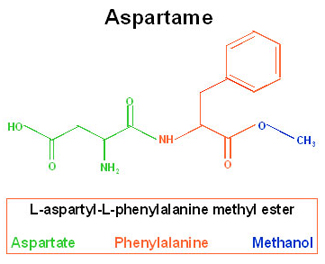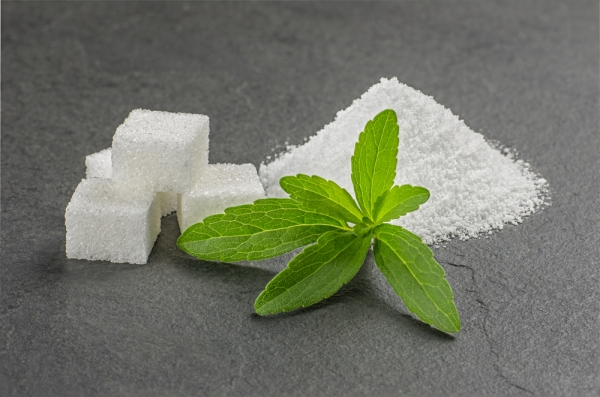Aspartame, simply defined, is an artificial sugar that is a simple chemical compound made up of: two amino acids (phenylalanine and aspartic acid) and a methyl group (CH3). The combination of these compounds creates a product that is 200x sweeter than sucrose.

This sweetener is marketed under a number of trademarked names, including: Equal and NutraSweet and is an ingredient in around 6,000 consumer foods and beverages sold worldwide!

In the digestive tract, enzymes split aspartame into its three parts, then the body absorbs the two amino acids and uses them just like it had come from food protein. Great caution needs to be taken when consuming this product because this sweetener contains phenylalanine. Products containing aspartame must have a warning label for people with phenylketonuria (PKU). PKU is an inherited disease that inhibits a person’s ability to dispose any excess phenylalanine. An accumulation of phenylalanine and its by-products is toxic to the developing nervous system, causing irreversible brain damage.
During metabolism, the methyl group momentarily becomes methanol, a methyl alcohol, which is potentially toxic. Enzymes then convert methanol to formaldehyde, another toxic compound. Finally, formaldehyde is broken down to carbon dioxide. Before aspartame could be approved, the quantities of these products generated during metabolism had to be determined, and they were all found to be below the threshold that would cause harm.
An Italian study found that aspartame caused cancer in female rats and fueled the controversies surrounding aspartame’s safety. However, statements from the FDA and other sources indicated that such a conclusion is not supported by the data.
The Acceptable Daily Intake (ADI) for aspartame is 50mg per kilogram of body weight, this is extremely high and the mass majority of our population does not even come close to this amount. Most people who use aspartame consume less than 5mg per kg of body weight per day.
In my opinion, it is best to go as natural and organic as you can and that your wallet allows you to, but if you decide to consume these products it’s OK! Just try to limit the amount of artificial sweeteners you put into your body.








